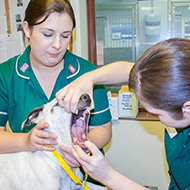The researchers found a strong link between ageing in dogs and the risk of developing dental disease.
“This research shows how much hidden misery our dogs often suffer" - Dr Dan O'Neill.
Toy poodles, King Charles spaniels, greyhounds and Cavalier King Charles spaniels are among the dog breeds at highest risk of dental disease, according to new research.
The study by the Royal Veterinary College (RVC) also found that brachycephalic breeds had a higher risk (1.25 times) of dental disease compared to breeds with mesocephalic (medium-sized) skulls.
It is hoped that the findings, published in the Journal of Small Animal Practice, will improve awareness of both the frequency of dental issues in dogs, as well as which breeds are most susceptible.
Lead author Dr Dan O’Neill, a senior lecturer in companion animal epidemiology at the RVC, said: “This research shows how much hidden misery our dogs often suffer from dental disease. Ask your vet to give you an update on the dental health of your dog at every visit. Be dental aware, and your dog will thank you.”
In the study, researchers from the RVC’s VetCompass programme used anonymised veterinary health records from some 22,000 dogs. After following the dogs for a year, they found that 12.5 per cent were affected by dental disease.
Besides the breeds most at risk of developing dental disease, the study found that smaller dog breeds had a higher risk of developing dental disease than heavier breeds.
There was also a strong link between ageing and the risk of developing dental disease, with dogs aged over 12 years being 3.91 times the risk compared with dogs aged two to four.
Co-author Claire Mitchell, an academic leader in science & engineering at the University of Nottingham International College, said: “This work represents an important step forward for dog dental health. Much other research links the head-shape of flat-faced dogs to other problems, so it makes sense that dental health would also be affected.
"It’s also really useful to know which breeds are more prone to dental disease. Hopefully we can now improve welfare for these dogs.”







 Birmingham Dogs Home has issued an urgent winter appeal as it faces more challenges over the Christmas period.
Birmingham Dogs Home has issued an urgent winter appeal as it faces more challenges over the Christmas period.
